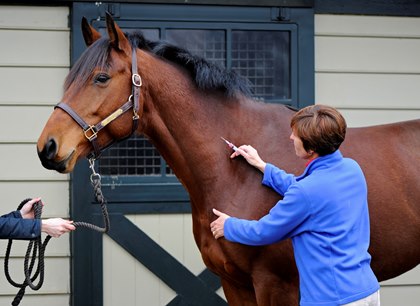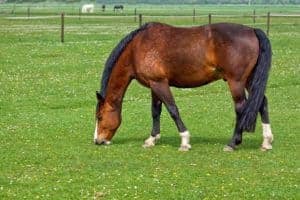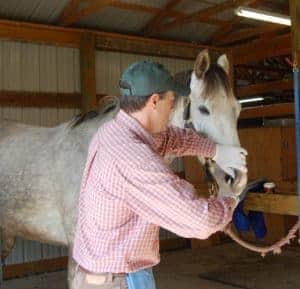Equine Vaccination Q&A
- Topics: Article, Diseases and Conditions, Eastern Equine Encephalitis (EEE), Equine Herpesvirus (EHV), Immune System, Rabies, Tetanus, Vaccinations, Venezuelan Equine Encephalitis (VEE), Vital Signs & Physical Exam, West Nile Virus (WNV), Western Equine Encephalitis (WEE), Working With a Veterinarian

Choosing a vaccine type, timing, and administration route can be a complex decision-making process. We’ll try to make it a bit simpler.
Perhaps you’re already in the rhythm of planning immunizations for your horses and have scheduled a spring veterinary visit. Or, you could be setting a veterinary care budget for your new horse for the very first time. Either way, you likely have at least a few questions surrounding your horses’ vaccination protocols. Here, our sources will answer some common vaccination queries we’ve received from our readers. Think of it as a virtual FAQ to keep you on your toes and the pathogens—those disease-causing agents that try to rain on your parade (or at least your horse show!)—at bay.
Q: Is there a “one-size-fits-all” vaccination approach?
A. Unfortunately, no. But your veterinarian can help you design the vaccine protocol that is most effective for each horse in your herd.
Every horse’s immune response to vaccination is different and subject to the effects of health status, age, and environmental exposure. “The concept of vaccination is to introduce a small amount of pathogen or representative protein from the pathogen so the immune system can ‘learn’ about that protein,” says Elizabeth Davis, DVM, PhD, Dipl. ACVIM-LAIM, professor and head of Equine Internal Medicine and Surgery at Kansas State University, in Manhattan. “With aging or disease, there is a natural reduction in responses induced by the immune system.” Older horses or those with disease (such as pituitary pars intermedia dysfunction, or equine Cushing’s) might need to be vaccinated in a slightly different manner than younger or more healthy horses.
“Other extraneous factors may influence immune function,” Davis adds. “Stress, such as experienced during long-distance transport and/or strenuous exercise, directly reduces the level of immune response that a host (the horse) can provide.” Always immunize well in advance of any anticipated stress (this also includes foaling, weaning, etc.) so the horse has sufficient time to respond to the vaccine(s).
Q. If my horse does not leave the farm, do I need to vaccinate him?

A. While your stay-at-home horse might not need as many vaccines as the frequent traveler, he does still need the core vaccines that the American Association of Equine Practitioners (AAEP) recommends. Every horse, regardless of location, age, or sex, should be vaccinated against Eastern and Western encephalomyelitis, West Nile virus, tetanus, and rabies. Talk to your veterinarian to determine whether your horse can do without risk-based vaccines, which protect against diseases specific to a region or type of horse.
“AAEP core vaccine guidelines should be followed for all horses—those traveling as well as those staying at home,” says Davis. “If contact with other horses is anticipated, then risk-based vaccines, such as EHV-1/4 (equine herpesvirus, or rhinopneumonitis), EIV (equine influenza virus), and strangles should also be considered.”
Q. Why do horses need to be vaccinated more frequently than humans or small animals?
A. It all has to do with immunologic memory. “Immunologic memory is the (body’s) immune response against an infectious pathogen that reacts more quickly after the immune system has been primed with an initial series of vaccines,” says Julia Felippe, DVM, MS, PhD, Dipl. ACVIM, associate professor at Cornell University’s College of Veterinary Medicine, in Ithaca, New York, who has a special interest in equine immunology. “Despite the fact that vaccines produce immunologic memory, circulating vaccine-specific antibodies and immune cells (in horses) drop in concentration and numbers after a few months; annual boosters keep these numbers somewhat steady.”
For pathogens that pose a high risk for infection, such as those abundantly found in the environment or transmitted by mosquitoes or by direct or close contact between horses, veterinarians recommend periodic vaccination.
Take tetanus for example: Horses live in an environment rich with equine fecal matter that contains the causative bacterium Clostridium tetani. This potential for exposure (e.g., through a wound) means horses should receive annual boosters against tetanus, says Davis.
Horses might also require more frequent boosters against respiratory and mosquito-borne viruses, depending on their risk of pathogen exposure. “Horses in a closed herd situation require fewer respiratory vaccines than horses competing at group activities,” says Davis. “Some vaccines are inactivated (killed, more on this coming up) and induce host protection, but protection may not last more than four to five months.”
This supports the rationale for providing booster respiratory immunizations once or twice a year. Similarly, veterinarians administer mosquito-borne virus vaccines in advance of mosquito season to confer the highest level of immunity, and in warmer climates horses might need boosters twice a year.
“A great deal of work has established guidelines for each vaccine,” Davis stresses. “Deviation from recommended protocols could put horses at greater risk to develop disease.”
Q. What is the difference between killed and modified-live vaccines?
A. As the names suggest, a killed vaccine is composed of an inactivated pathogen or a component of that pathogen, whereas a modified-live vaccine (MLV) maintains just enough viability for the organism to replicate in the host without causing disease. “The major difference is in how the immune system responds,” Davis explains. “Inactivated vaccines are effective at inducing antibody responses that provide the host with protection at the time of exposure or challenge, but this response may not last for an extended period of time.”
Inactivated vaccines activate this one arm of the immune system called humoral immunity, whereas modified-live vaccines induce responses from multiple arms of the immune system.
“Because MLV vaccines mimic natural infection, they are a better approach against pathogens with more complex pathophysiology and virulence in which cellular immunity is also required,” adds Felippe, referring to a concept called cell-mediated immunity. “Nevertheless, some killed vaccines (e.g., those against EEE, WEE, tetanus) induce robust production of neutralizing antibodies that are effective in controlling these specific infections. These vaccines have been available and in use for decades with their effectiveness proven—vaccinated horses do not get sick while horses that are not vaccinated do.”

Q. Are intranasal respiratory vaccines better than standard intramuscular vaccines?
A. The purpose of using intranasal vaccination in horses is to induce local immunity at the site where the pathogen invades—in this case, the respiratory tract. Davis says the advantages of intranasal vaccines are twofold: The protection is both local (mucosal) and rapid. “If, however, the goal of vaccination is to induce a memory antibody response that can be transferred from host to another individual, such as a broodmare providing protection to her foal through high-quality colostrum, then an intramuscular vaccine is more desirable,” she says.
Q. What is herd immunity?
A. The concept of herd immunity is important in groups of horses. If all individuals are immunized within a group, then it is less likely that an individual animal will get sick from infection. The herd’s overall risk for developing disease is lower because there is far less opportunity for disease exposure. “Vaccination decreases severity of disease and shedding of organisms, therefore decreasing transmission between individuals,” notes Felippe.
Davis describes two examples of how herd immunity works: In the first, a group of 30 horses is not immunized against equine influenza virus (EIV). Upon exposure, the horses develop variable severity and duration of disease; the virus spreads among the group until all have developed disease and recovered or had previous exposure that provides protective immunity. Compare this scenario to a group of 30 horses whose owners or managers have applied excellent EIV vaccine protocols. If a single horse out of 30 is not vaccinated or has low-level immunity against the virus, yet the majority of horses are protected from infection, then the virus does not become embedded in the group and, therefore, has limited ability to cause disease in a single at-risk individual.
Q. Should senior horses be vaccinated as frequently as younger and adult horses?
A. Older horses experience a phenomenon known as immunosenescence—the immune system is not as robust as it was at a younger age. “There is no specific recommendation that senior horses need to be vaccinated more frequently than younger horses, but immunization with appropriate vaccine protocols should be administered regularly to maintain an optimal level of immunity,” Davis says. She stresses that in addition to following core vaccine protocols, owners should continue to use effective biosecurity, herd health, and preventive care practices when managing these horses, along with offering good nutrition.
Q.If a regularly immunized horse misses spring shots one year, will I need to repeat the priming series of two to three injections?
A. “Vaccine protocols are designed for young horses to begin receiving vaccines in the first year of life,” says Davis. “The first vaccine induces a primary response (in which “memory cells” develop a long-lasting immunity to that pathogen). Subsequent vaccines in the primary series and future boosters then induce a secondary (anamnestic or memory) immune response.”
“In theory, there should be immunologic memory lasting beyond one year,” says Felippe.
If a horse has received an initial priming vaccine series and is late or misses one annual booster, he is likely to respond appropriately to a booster vaccination with an effective anamnestic immune response, says Davis. “If the previous vaccine history is unknown; then the horse (adult or young) should be started with a primary vaccine series followed by appropriate boosters, according to vaccine guidelines,” she adds.
Q. How long before travel or competition should my veterinarian give respiratory boosters?
A. “Vaccines should be given no less than 14 days prior to potential pathogen exposure,” says Davis.
“If a horse must receive the full primary immunization series, then five weeks may be needed in order to include a booster,” adds Felippe.
A booster two to four weeks before travel or competition gives a horse time to mount a sufficient anamnestic response and also allows time for any mild intramuscular vaccine reactions to resolve. An exception to the two-week recommendation is a vaccine that activates immunity in a shorter period, such as the intranasal influenza vaccine that can provide protection in seven days.
Q. Does giving a combination (multivalent) vaccine offer the same protection as multiple products that each protect against a single disease?
A. Study results have shown that multivalent vaccines provide good protection from all pathogens included in them. Davis describes a study in which researchers compared the antibody levels a WNV-containing multivalent vaccine produced with those a West Nile virus-only (monovalent) vaccine -produced. “Investigators found that the level of antibody produced from a monovalent WNV vaccine was higher than stimulated by a multivalent vaccine containing WNV,” she says. “There isn’t any evidence that combination vaccines with WNV lack efficacy in inducing an immune response that provides host protection, but maximal protection comes from WNV vaccine given as a standalone.”
Q. Are there downsides to owners vaccinating their horses themselves, without veterinarian oversight?
A. Ideally, horse owners should consult their veterinarians about vaccine protocols and practices. “An owner who chooses to administer their own vaccines needs to know exactly what they are administering and ensure that the vaccine is an effective product,” says Davis.
Effective means the product has been handled properly from the time the manufacturer prepared the vaccine until the vaccine is administered to the horse. Vaccines can be rendered ineffective by temperature fluctuations, for example. “The horse owner may handle the vaccine properly once purchased, but it may not be known how the vaccine was handled prior to purchase, possibly from a feed store or online,” she adds.
Another consideration is the possibility of a serious adverse event such as a severe allergic reaction (anaphylaxis) or a life-threatening infection with anaerobic bacteria (Clostridia) at the injection site.
“Although such complications are uncommon, they do occur occasionally and are handled best by a veterinarian who has extensive experience with vaccine preparation and administration,” Davis says, adding that in many states and by law, a veterinarian must administer rabies vaccinations.
Further, “If there is a vaccine complication or impaired efficacy following vaccination, the vaccine manufacturer is less likely to take responsibility for the adverse complication if the vaccine was not administered by a veterinarian,” she says. There could also be repercussions regarding an insurance company’s policy coverage.
Q. Can vaccines be administered anywhere besides the horse’s neck?
A. The objective of an effective injection is to deposit vaccine material deep within a muscle belly where the circulatory system can pick the material up and spread it to the immune system. Any large muscle works fine—the neck, the thigh, or the pectorals. The haunches are probably not the best choice, because if an abscess forms, which occurs rarely, that area is difficult to drain. Many inject the neck because of its easy access and safety for the person administering the vaccine. Like the neck, the chest muscles and the long muscles of the thigh drain readily and dissipate swelling quickly. However, if a horse develops soreness, discomfort in the hind end from a thigh or haunch injection can put him out of training; the same is true for the pectoral muscles, which the horse relies on for locomotion.
Q. What’s “normal” for a vaccine reaction?
A. Occasionally, a horse might develop an allergic reaction to various components of the vaccine. Most vaccine reactions are mild and transient, occurring within 24 to 48 hours following immunization and resolving within two to three days. Reactions involve any of the following: local soreness or swelling at the injection site, a stiff gait, mild fever, lethargy, and/or reduced appetite. More serious but unusual reactions include swollen limbs or colic. Giving a horse a non-steroidal anti-inflammatory drug (NSAID) might hasten resolution, but talk to your veterinarian before administering anything. If a horse has a known vaccine sensitivity, giving an NSAID at the time of immunization can help forestall an adverse reaction.
Rarely, horses suffer anaphylactic reactions, which can be life-threatening.
Q. Why do some horses have reactions to vaccines while others don’t?
A. How a horse reacts to vaccination is a reflection of his immune system. “It is hard to predict which horse will have an adverse reaction and when it will occur,” Davis says. “This is an important reason to consider having a veterinarian involved with vaccine administration, because if an adverse reaction occurs, your veterinarian has appropriate medications on hand, along with experience to treat the horse.”
Take-Home Message
You and your veterinarian have an established professional relationship that allows you to make informed decisions for your horses. Equine veterinarians are knowledgeable about protecting against communicable diseases relative to your geographic area, and they are also familiar with your individual horse’s current and unique state of health and risk of exposure. Always consult your veterinarian about which vaccines to give and when.

Written by:
Nancy S. Loving, DVM
Related Articles
Stay on top of the most recent Horse Health news with















